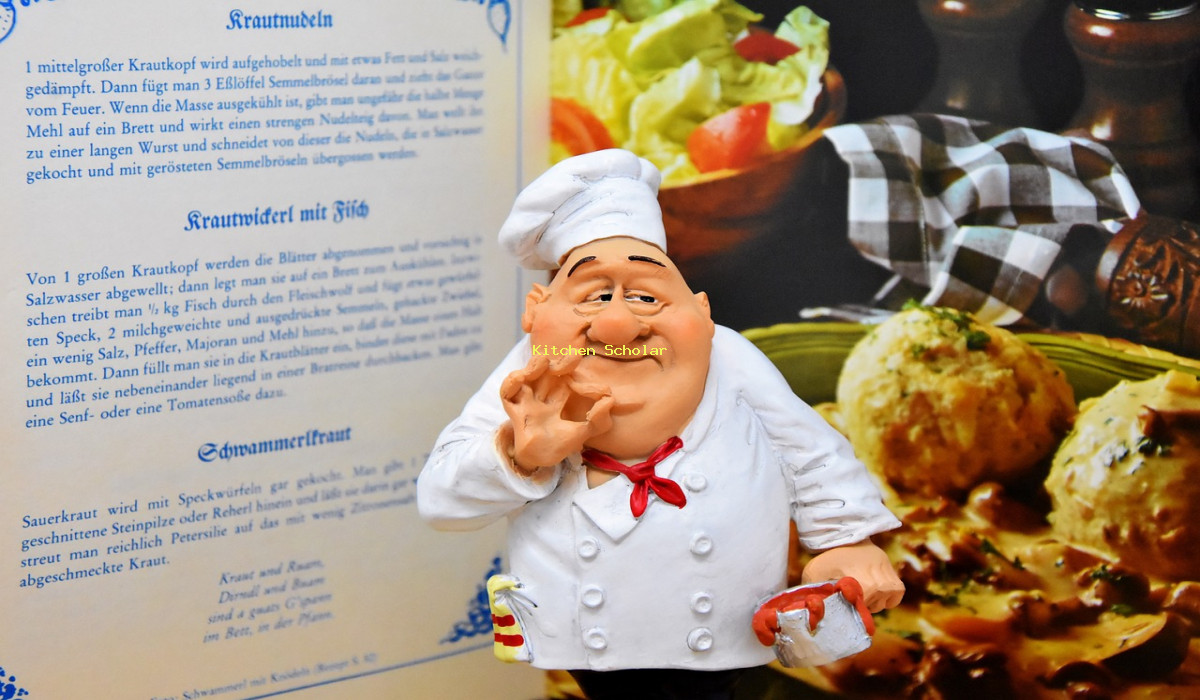10 Essential Duties of a Kitchen Manager: A Comprehensive Job Description. Searching for a kitchen manager job description? Look no further! Our comprehensive guide breaks down the responsibilities, requirements, and benefits of this position in a clear and conversational tone. Learn more about what it takes to excel as a kitchen manager and kickstart your career in the culinary world.
10 Essential Duties of a Kitchen Manager: A Comprehensive Job Description. in a clear 10 Essential Duties of a Kitchen Manager: A Comprehensive Job Description
The Role of a Kitchen Manager: A Comprehensive Job Description
As a kitchen manager, you are responsible for overseeing the day-to-day operations of a restaurant’s kitchen. You play a crucial role in ensuring that the kitchen runs smoothly and efficiently, from managing food preparation and inventory to supervising staff and maintaining safety standards.

This job requires a combination of culinary skills, leadership abilities, and strong organizational skills. In this blog post, we will delve into the details of this job and highlight the key aspects of a kitchen manager’s role.
Job Overview
The job of a kitchen manager can be summed up as the head of the kitchen. You are responsible for making sure that the kitchen operates smoothly and that the customers receive high-quality food. It is a fast-paced and demanding job that requires multitasking and being efficient in managing time and resources. Your role is critical in the success of a restaurant and can be both challenging and rewarding.
Kitchen Management Duties
As a kitchen manager, your primary responsibility is to oversee the daily operations of the kitchen. This includes ordering and managing inventory, creating menus, managing food costs, and ensuring that all meals are prepared to the highest standards. You are also responsible for overseeing the kitchen staff, from hiring to training and scheduling. Your job also involves ensuring cleanliness and safety standards are met to maintain a sanitary and organized kitchen.
Menu Planning and Food Preparation
One of the crucial responsibilities of a kitchen manager is menu planning and food preparation. You must have excellent culinary knowledge, be creative with menu ideas, and be able to prepare meals according to the restaurant’s standards. This requires an understanding of food costs, inventory management, and knowing how to create dishes that are delicious and visually appealing. As a kitchen manager, you must also ensure that food allergies and dietary preferences are accommodated for all customers.
Staff Management
Managing the kitchen staff is one of the essential duties of a kitchen manager. From hiring and training to scheduling and delegating tasks, it is your responsibility to build a strong and efficient team. You must have excellent leadership skills to motivate and oversee the kitchen staff to ensure that all tasks are completed on time and to the restaurant’s standards. It is also crucial to foster a positive work environment to promote teamwork and productivity.
Inventory Management
Inventory management is a vital aspect of a kitchen manager’s role. You must be aware of the restaurant’s inventory levels and ensure that orders are placed in a timely and efficient manner. It is essential to have strong organizational skills to keep track of inventory and ensure that it is properly stocked. Proper inventory management is crucial in controlling food costs and minimizing food waste.
Maintaining Safety Standards
Safety in the kitchen is of utmost importance, and as a kitchen manager, you are responsible for ensuring that safety protocols are followed. This includes maintaining a clean and organized kitchen, managing hazardous materials properly, and ensuring that all kitchen staff follow proper food handling techniques to prevent foodborne illnesses. It is your job to conduct regular inspections to ensure that all equipment and facilities are in good working condition, and that any issues are addressed promptly.
Qualifications and Skills
To become a successful kitchen manager, you must have culinary training and experience in a professional kitchen. A degree in culinary arts or hospitality management is often preferred, but not mandatory. You must also possess excellent leadership skills, strong communication skills, and be able to multitask efficiently. Being detail-oriented and having strong organizational and time-management skills are also essential in this role.
The Challenges and Rewards of Being a Kitchen Manager
Being a kitchen manager is not an easy job, but it can be incredibly rewarding. The fast-paced environment and various responsibilities can be very demanding, but it also means that no two days are the same. You have the opportunity to be creative, lead a team, and be at the forefront of delivering high-quality food to customers. Your role plays a significant part in the success of a restaurant, and that sense of accomplishment is incredibly rewarding.
10 Essential Duties of a Kitchen Manager: A Comprehensive Job Description
Searching for a kitchen manager job description? Look no further! Our comprehensive guide breaks down the responsibilities, requirements, and benefits of this position in a clear and conversational tone. Learn more about what it takes to excel as a kitchen manager and kickstart your career in the culinary world.. Kitchen Manager
Manager 10 Essential Duties of a Kitchen Manager: A Comprehensive Job Description
A Comprehensive Guide to Kitchen Manager Job Description
Are you interested in a career in the foodservice industry? Do you have a passion for organization and leadership? If so, becoming a kitchen manager may be the perfect job for you. In this comprehensive guide, we will delve into the responsibilities, skills, and qualifications needed for this position. We will also discuss the tasks, challenges, and career path for aspiring kitchen managers.
What Does a Kitchen Manager Do?
A kitchen manager is responsible for overseeing the daily operations of a kitchen in a restaurant or food establishment. They ensure that food is prepared, cooked, and served properly, while also managing the kitchen staff and maintaining inventory. Their main goal is to ensure that the kitchen runs smoothly and efficiently to deliver high-quality food to customers.
A kitchen manager’s duties can vary depending on the size of the establishment. In smaller restaurants, they may have more hands-on duties, while in larger establishments, their role may be more focused on management and delegation.
Skills and Qualifications
To be successful as a kitchen manager, you must possess a variety of skills and qualifications. These include:
- Leadership: Leading and managing a team of kitchen staff is a crucial part of the job. A kitchen manager must have strong leadership skills to effectively direct and motivate their team.
- Organization: A kitchen manager must be highly organized to oversee various tasks such as scheduling, inventory management, and food preparation.
- Communication: Clear and effective communication is essential for a kitchen manager to delegate tasks, provide instructions, and resolve conflicts.
- Culinary knowledge: While not always required, having a solid understanding of cooking techniques and ingredients is beneficial in this role.
- Time management: A kitchen manager must be able to manage their time effectively to ensure that food is prepared and served on time.
- Attention to detail: With food safety and quality being top priorities, a kitchen manager must have strong attention to detail to ensure that all dishes meet standards.
In terms of qualifications, most kitchen manager positions require a high school diploma or equivalent and previous experience in the food industry. Some establishments may also prefer candidates with a degree or certificate in culinary arts or hospitality management.
Duties and Responsibilities
The specific duties and responsibilities of a kitchen manager may vary depending on the restaurant or establishment they work in; however, some common tasks include:
- Menu planning: Collaborating with the chef to develop menu specials and ensuring that all ingredients and supplies are available.
- Scheduling: Creating work schedules for kitchen staff and managing shift changes or time-off requests.
- Ordering and inventory: Monitoring food and supply inventory levels and placing orders to replenish stock when necessary.
- Food preparation and quality control: Ensuring that all dishes are prepared according to recipes and quality standards.
- Staff management: Supervising, training, and disciplining kitchen staff as needed.
- Maintaining kitchen equipment: Overseeing the maintenance and cleanliness of all kitchen equipment.
- Ensuring food safety: Following all sanitation and safety regulations to maintain a clean and healthy kitchen environment.
Challenges Faced by Kitchen Managers
Like any job, kitchen managers may face certain challenges in their role. Some of these include:
- Managing conflict: In a fast-paced and high-stress environment, conflicts may arise between kitchen staff. A kitchen manager must be able to handle and resolve these conflicts efficiently.
- Time management: With many tasks to manage and limited time, time management can be a significant challenge for kitchen managers.
- Handling pressure: Working in a hectic kitchen environment and meeting customer expectations can be overwhelming for some individuals.
- Staff turnover: The restaurant industry is known for high staff turnover rates, which means kitchen managers may need to frequently train and supervise new employees.
Career Path for Kitchen Managers
Becoming a kitchen manager is an excellent starting point for those interested in a career in the foodservice industry. Many kitchen managers eventually move on to higher positions such as head chef or restaurant manager. With experience and additional training, some may even open their own restaurants.
Conclusion
In conclusion, a kitchen manager is a crucial role in the foodservice industry. They are responsible for overseeing the daily operations of a kitchen, managing staff, and maintaining inventory. To be successful in this role, one must possess a variety of skills, qualifications, and the ability to handle challenges. With experience and dedication, becoming a kitchen manager can lead to a rewarding and fulfilling career path in the restaurant industry. 10 Essential Duties of a Kitchen Manager: A Comprehensive Job Description

10 Essential Duties of a Kitchen Manager: A Comprehensive Job Description
What are the duties of a kitchen manager?
A kitchen manager is responsible for ensuring the smooth operation and organization of a restaurant’s kitchen. This includes supervising kitchen staff, managing inventory and stock, ensuring food safety and quality standards are met, and creating menus that are both cost-effective and appealing to customers.
What are the skills required for a kitchen manager?
Some crucial skills for a kitchen manager include strong leadership and communication abilities, organization and time management skills, knowledge of food safety and health regulations, and proficiency in menu planning and costing.
What is the role of a kitchen manager in food safety?
A kitchen manager plays a vital role in maintaining food safety standards and preventing foodborne illnesses. This includes proper storage, handling, and cooking of food, regular cleaning and sanitization of kitchen equipment, and enforcing hygiene practices among staff members.
What experience is needed for a kitchen manager?
Most employers require a minimum of 2-3 years of experience in a kitchen or food service management role for a kitchen manager position. This ensures that the individual has a good understanding of the kitchen operations and is capable of overseeing a team of kitchen staff.
Is a culinary degree necessary for a kitchen manager?
While a culinary degree is not mandatory for a kitchen manager position, it can be beneficial as it demonstrates an individual’s knowledge and skills in cooking and food preparation. However, experience and skills are often valued more in this role.
What are the challenges of being a kitchen manager?
Some common challenges faced by kitchen managers include dealing with staff turnover and conflicts, managing a high-pressure and fast-paced work environment, ensuring food quality and consistency, and staying up-to-date with industry trends and changes in food safety regulations.
How does a kitchen manager handle inventory and stock?
A kitchen manager is responsible for managing inventory and stock levels to ensure that the kitchen has all the necessary ingredients and supplies to operate smoothly. This includes ordering and restocking items, tracking inventory levels, and minimizing waste and spoilage.
What is the salary range for a kitchen manager?
The salary of a kitchen manager can vary depending on factors such as location, restaurant size, and experience. On average, a kitchen manager can expect to earn between $40,000-$60,000 per year, with potential for bonuses and other benefits.
How can a kitchen manager improve efficiency in the kitchen?
To improve efficiency in the kitchen, a manager can implement strategies such as creating a streamlined system for taking and fulfilling orders, training and cross-training staff to handle different tasks, and regularly reviewing and adjusting menu items based on popularity and cost-effectiveness. 10 Essential Duties of a Kitchen Manager: A Comprehensive Job Description

